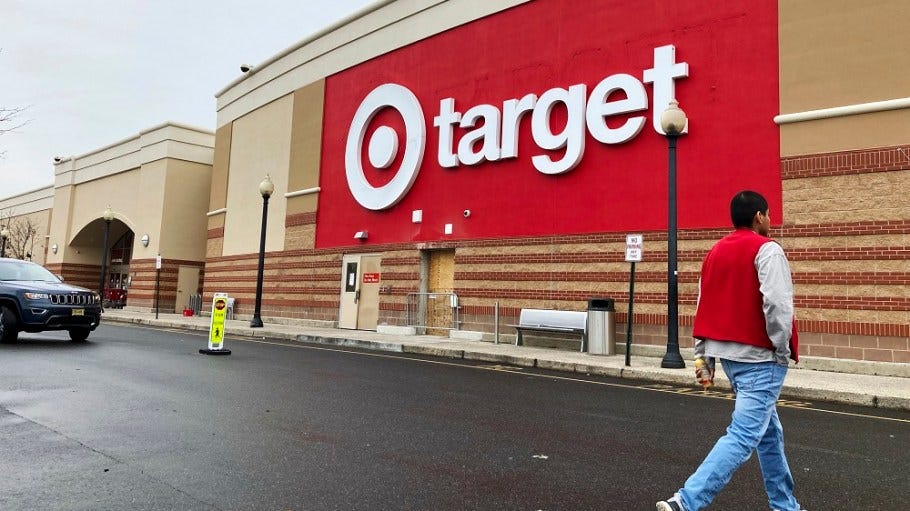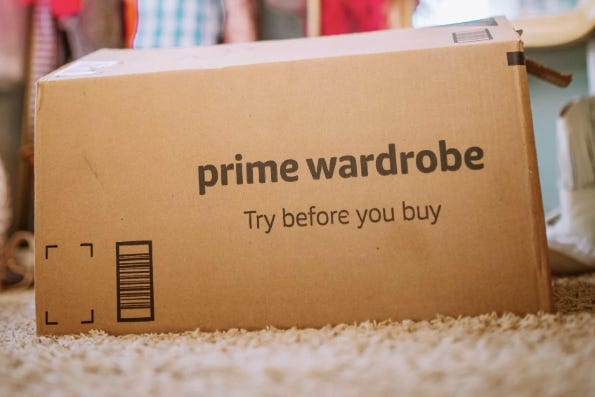This Week in Retail #61
Hey Friends,
Last week I had the pleasure of attending NRF’s Big Show with 40,000 of my closest retail enthusiasts. While my full recap will be posted shortly, this year’s show was so-so. The keynotes were fantastic, who can’t get excited to listen to Walmart and NVIDIA discuss AI disruption in retail, but overall I thought the tech was meh. This is the year of AI, sort of, more so in the functionality and troubleshooting rather than true customer facing applications. I have no doubt we'll get there, but there are no magic bullets on display. This year’s tech was dominated by mobile and self-service, flexible payment and loyalty. There was an emphasis on personalized shopping experiences, built around connected shopping experiences which I am very excited about.
My favorite story of the week……Walgreens CEO Timothy Wentworth shared that locking up products to prevent theft has led to decreased sales, with a 52% increase in "shrink" (lost inventory) following the implementation of such measures. He acknowledged that locking items like toothpaste resulted in fewer sales, highlighting the strategy's ineffectiveness. The company is now seeking alternative ways to balance theft prevention with customer convenience, exploring methods such as surveillance, smart gates, and electronic tags.
Despite these challenges, Walgreens reported a 7.5% increase in sales in Q1 of fiscal 2025, reaching $39.5 billion, driven by higher pharmacy sales. The company is also closing about 1,200 underperforming stores and executing a $1 billion cost-reduction plan, boosting investor confidence with a 32% increase in stock price since January 1. Walgreens’ efforts to address rising theft, such as the arrests of youth suspects in San Francisco, have underscored the retail theft issue. However, the company's lock-and-key solution has not proved successful, leading to continued struggles with balancing security measures and maintaining sales. I think it goes without saying, shrink is not just a theft problem, but creating strategies around theft alone make your customer’s experience miserable. Miserable customers typically buy less. With the rapid growth of online, or E-commerce pharmacy as I like to think of it, competition will only get stiffer. I think the majority of Walgreens shoppers rely on convenience rather than comfort, and this solution doesn’t aid in that.
U.S. retail sales increased by 0.4% in December, following an upwardly revised 0.8% gain in November, according to the Commerce Department. Year-over-year, sales rose 3.9%. This growth, driven by higher vehicle purchases and strong performance across multiple categories, reflects robust consumer demand and a healthy labor market.
Some key figures below:
Auto sales rose 0.7% after a 3.1% jump in November.
Furniture store receipts increased by 2.3%, and clothing sales rebounded 1.5%.
Sporting goods and hobby sales climbed 2.6%, while miscellaneous retailers saw a 4.3% surge.
Online sales edged up 0.2%, but food services and drinking places fell 0.3%, likely due to freezing temperatures.
Gasoline sales rose 1.5%, while building material store sales dropped 2.0%.
Economists revised Q4 growth estimates upward, approaching Q3's strong pace, supported by a tight labor market and wage growth. However, underlying inflation trends remain moderate. The Federal Reserve is unlikely to cut interest rates soon, given the economy's strength and full employment. Speculation about consumer behavior ahead of potential tariffs under President-elect Donald Trump, set to take office this week, appears minimal. Bank of America data suggests little evidence of a pre-tariff purchasing surge.
DHL Supply Chain has acquired Inmar Supply Chain Solutions, a division of Inmar Intelligence, solidifying its position as the largest provider of reverse logistics solutions in North America. This strategic acquisition adds 14 return centers and approximately 800 associates to DHL's extensive North American network, which includes over 520 warehouses and 52,000 associates.
Expanded Capabilities: The acquisition enhances DHL’s reverse logistics services, including product remarketing, recall management, and supply chain analytics.
Sustainability Focus: Inmar’s recommerce solutions, which divert 99% of consumer returns from landfills, align with DHL’s goal of decarbonizing its operations by 2050.
Strategic Growth: The move supports DHL’s Strategy 2030, which targets 50% revenue growth by 2030 compared to 2023.
Market Implications: With e-commerce growth and evolving consumer expectations, returns management has become a crucial retail touchpoint. DHL aims to streamline complex supply chain challenges, reduce costs, and combat returns abuse for retailers while enhancing sustainability.
Target revealed three leadership changes effective February 2, alongside an encouraging holiday sales update:
Mark Schindele, Chief Stores Officer, will retire after 25 years. Adrienne Costanzo, SVP of Store Operations, will succeed him.
Brett Craig, Chief Information Officer, is leaving. Prat Vemana, Chief Digital and Product Officer, will assume a combined role as Chief Information and Product Officer.
Sarah Travis, Head of Social Commerce and Roundel, will become Chief Digital and Revenue Officer.
Holiday Sales Update:
Overall sales rose 2.8% in November and December year-over-year, with comparable sales up 2% and digital sales growing nearly 9%.
The Target Plus digital marketplace grew nearly 50%.
Black Friday and Cyber Monday achieved record-high sales, driven by a 3% rise in customer traffic across stores and online.
Target now expects Q4 comparable sales to rise 1.5%, exceeding prior forecasts of flat performance. Analysts described the holiday season as “encouraging,” with growth in discretionary categories like toys and apparel.
CEO Brian Cornell credited the success to Target’s ability to “drive relevance, value, and traffic” during key shopping periods. New leadership appointments suggest a potential shift in strategy, emphasizing digital growth, technology, and AI to compete with Walmart and Amazon.
Target also highlighted its value-driven initiatives, such as the Target Circle 360 loyalty program and price cuts on 10,000+ items, though analysts noted challenges in grocery market share.
Some changes are also taking place at Amazon…..Amazon confirmed layoffs affecting roughly 200 employees in its North America stores division, which includes private label brands, Prime membership, and consumables. The move is part of an organizational restructuring to align with company priorities. Primarily impacted are those in the fashion and fitness sectors, with Amazon stating its commitment to supporting affected employees during the transition.
Amazon has been reducing costs and focusing on profitability by scaling back unprofitable initiatives such as its telehealth services, brick-and-mortar delivery program, and clothing try-on service. The restructuring reflects Amazon's ongoing efforts to streamline operations and refocus on core business priorities. These layoffs are part of a broader cost-cutting effort under CEO Andy Jassy, with approximately 27,000 positions eliminated since 2022.
Amazon will phase out its Try Before You Buy service on January 31, citing increased customer adoption of AI tools like virtual try-ons and personalized size recommendations. The program, launched in 2017 as Prime Wardrobe, allowed Prime members to try select apparel, shoes, and accessories for seven days before purchasing.
The service added complexity and encouraged returns, which have become a significant financial and logistical burden for retailers. With returns are rising each year, ($890 billion in merchandise expected to be returned in 2024, representing 17% of retailers’ annual sales) I get the focus on removing added headaches.Stitch Fix, a competitor when the service launched, has struggled with declining revenues, and similar services like Trunk Club have shut down.
Amazon’s move reflects its focus on streamlining operations and leveraging AI to enhance customer experiences in the increasingly complex apparel sector.
Sephora is embarking on its most extensive store renovation project to date, aiming to revamp all its North American locations over the next five years. Announced by CEO Artemis Patrick at the National Retail Federation's Big Show, this initiative is driven by consumer feedback and shopping behavior analysis. The redesigns will vary from minor updates to major overhauls, focusing on:
Store Layouts: Transitioning from brand-specific gondolas to a layout centered on key product categories—makeup, skincare, fragrance, and hair care—to enhance flexibility and ease of updates.
Beauty Studios: Relocating beauty studios to the sides of stores to provide customers with more privacy during makeup applications.
Minis Section: Moving the minis section to the front of stores, accommodating the increase in mobile checkouts and improving customer convenience.
“The overarching goal is to deliver a consistent and enhanced shopping experience across all regions, ensuring uniformity whether customers are in urban centers or smaller markets.”
Their competition, Ulta Beauty also made some announcements this week……The beauty retailer has teamed up with Instacart to offer same-day delivery from its 1,400+ stores nationwide, enabling customers to receive beauty products in as little as one hour. Facing increasing competition from Sephora, this new partnership complements Ulta's existing same-day delivery collaboration with DoorDash, which began in 2021 and expanded to cover over 1,300 locations. This partnership is a win-win for both parties; Ulta sees the partnership as a way to enhance customer convenience, flexibility, and access to a broader audience while, Instacart views the partnership as an opportunity to expand its offerings beyond grocery delivery.
This announcement coincides with leadership changes at Ulta Beauty. Chief Operating Officer Kecia Steelman has been named CEO, succeeding Dave Kimbell, who will remain as an advisor until June 28.
Joann Inc., the nation's largest sewing and fabrics retailer, has filed for Chapter 11 bankruptcy protection for the second time within a year. The company attributes this decision to ongoing challenges, including inventory shortages, high inflation, increased competition, and supply chain disruptions.
Despite emerging from its previous bankruptcy with reduced debt, Joann still holds approximately $615.7 million in liabilities. In 2024, the company reported $2 billion in net sales and currently operates 800 stores across 49 states, employing 19,000 people.
Interim CEO Michael Prendergast announced that Joann is seeking to maximize its business value through a court-supervised sale process. The company is looking to sell substantially all of its assets to Gordon Brothers Retail Partners LLC, which plans to liquidate the company and conduct going-out-of-business sales. During this process, Joann intends to keep its stores and online operations open and is actively seeking alternate bids to continue operating.
This second bankruptcy filing underscores the significant challenges Joann faces in the current retail environment, while this may not 100% signify the end, strike 2 feels like you’re out to me.
Walmart named a change to its C-Suite…. Effective February 1, Dave Guggina, previously the Executive Vice President of Supply Chain, will assume the role of U.S. Chief E-Commerce Officer, succeeding Tom Ward. Ward will transition to Chief Operating Officer of Sam's Club, Walmart's warehouse. Guggina's appointment underscores Walmart's commitment to enhancing its online presence and operational efficiency. His prior experience in automating the supply chain positions him to drive advancements in e-commerce, aiming to improve delivery times and expand product offerings. This strategic move aligns with Walmart's broader efforts to invest billions into its e-commerce business, responding to the growing consumer preference for online shopping.
Walmart has partnered with resale platform Rebag to offer tens of thousands of pre-owned luxury handbags, jewelry, and watches through its marketplace. Beginning January 16, Rebag will sell its full catalog of about 27,000 items, including high-end brands like Louis Vuitton, Hermès, Chanel, Gucci, and more. This partnership expands Walmart's selection of used luxury items, contributing to a newly launched section on Walmart’s website dedicated to luxury resale.
The move aims to attract fashion enthusiasts and drive traffic to Walmart’s site by offering in-demand, hard-to-find brands. It also aligns with Walmart’s sustainability goals, providing access to luxury items that may otherwise be out of reach for customers. Walmart has previously partnered with StockX to expand its offering of high-demand sneakers. The addition of Rebag’s catalog is expected to boost Walmart’s third-party marketplace, which has seen over 30% sales growth in each of the past five quarters.
Walmart’s focus on luxury resale also helps target higher-income shoppers and enhances the potential of its advertising platform, Walmart Connect. This partnership allows Rebag to reach a broader audience and build awareness for luxury resale, further solidifying Walmart's position as a competitor to Amazon in e-commerce.
For those of you following the TikTok saga, Yesterday, the TikTok ban lasted less than a day before President-elect (at that time) Trump made a pledge to restore the app. On Sunday morning, Donald Trump announced on Truth Social that he would revive TikTok by approving a new ownership arrangement via an executive order once in office. His "current thought" was to create a "joint venture" where the U.S. government would own 50%, with the other half held by TikTok's Chinese owner or another buyer. By midday Sunday, TikTok was once again available to U.S. users, seemingly based on Trump’s promises.
That’s all folks….Have a great week.







